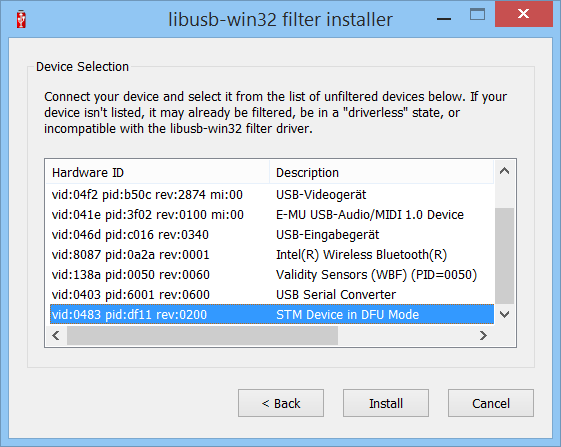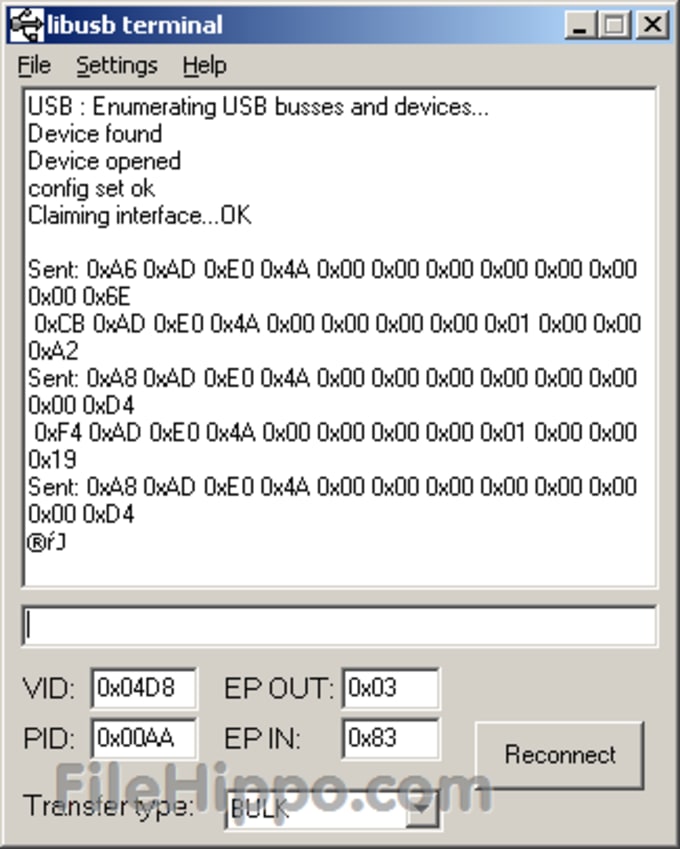Libusb-1.0 API Reference. Libusb uses the underlying libusb C shared library as specified in libusb.cfg (included libusb-X.X. is the default), but there is also ability to specify it programmatically by one of the following ways. Libusb0.dll, File description: LibUsb-Win32 - Generic USB Library Errors related to libusb0.dll can arise for a few different different reasons. For instance, a faulty application, libusb0.dll has been deleted or misplaced, corrupted by malicious software present on your PC or a damaged Windows registry. If you are updating to a new version of Argyll which adds support for a new instrument that you want to use, then it may be necessary to uninstall all the existing Argyll USB driver and do a fresh re-install to update the relevant libusb system driver and.inf file. Download libusb0.dll LibUSB-Win32 - DLL version 0.1.10.2 32bit. Download DLL, OCX and VXD files for windows for free. 2 7 2 1 0 f 7 e 7 2 9 0 4 4 3 0 1 e 1 c 5 b.
Zadig: Driver Installation
These brief instructions describe how to install an RTL2832U TV tuner stick on your Windows PC. Your version of Windows must be XP SP3 or later. Microsoft does not support WinUSB on Windows 2000 or NT (and don't even ask about 9X/ME).

Download Libusb 1.0 Driver 64-bit
- Boot up Windows and plug your RTL stick into an open USB slot.
- Run Device Manager to verify that Windows has found the device.
- Download Zadig from here.
- Run Zadig to associate Microsoft's WinUSB driver with the device.
- Choose WinUSB and click 'Install Driver'.
- At this point, you should be able to test programs like SDR# and Unitrunker with your RTL stick.
Device Manager shows us what devices are attached and in what state. However, later versions of Windows made it harder to navigate to the right place to run Device Manager.
This works with Windows 8.1 (only):
Press the pair [Windows]+X where [Windows] is the Windows key and X is the 'X' key. A context menu will appear. Click 'Device Manager'.
For XP, Vista, 7, and 8.0:
Press the pair [Windpws]+R where [Windows] is the Windows key and R is the 'R' key. A popup dialog will appear prompting you to type a command or program name. Type 'control' and press return. This will run the control panel. From the control panel, click 'Hardware and Sound'. Under 'Devices and Printers', select 'Device Manager'.
There are two versions of Zadig. If you have Windows XP, you should download the XP version and read this.
Zadig does a lot of work behind-the-scenes like copying the appropriate drivers, creating an INF file, and adding registry entries so that the numerous layers of Windows can find everything each time your USB stick is plugged into a USB slot.
Zadig offers three choices - WinUSB, libusb0, and libusbK.
My only gripe with Zadig is it does not clean up after itself. It you re-install a driver (or swap out drivers), the old INF files are still there (more on this later).
After Zadig points Windows to the correct driver, you should see this:
For software that makes use of the rtl-sdr software library, download libusb. Extract the appropriate 32 or 64 bit version of libusb-1.0.dll and place it in the application folder. Do not copy it to your Windows folder. It's an application DLL, not a system DLL. One bad actor installs an old version of libusbx (1.0.8) in a Windows system folder, breaking programs that expect latest version (1.0.18 as of this writing).
The following information may help advanced Windows users:
The INF file installed by Zadig goes in your WindowsInf folder and looks something like:
The actual file is longer. The above text should be enough to help you recognize it. The file is named 'OEMxx.inf' where xx is a number that increases each time you run Zadig. The old INF file isn't removed. Zadig also adds keys to the registry that point to this file.
Look under HKEY_LOCAL_MACHINESYSTEMCurrentControlSetEnumUSB for a list of VID/PID pair registry keys. See the device ID in the INF above? The key will have a similar name. Your device may have a different VID and PID value. Under that key will be another key that is the eight digit serial number of your RTL stick. Using one of my sticks as an example:
Under this key are a dozen or so values. The Mfg and DeviceDesc values point to our INF file above. For example:
Suppose you accidentally installed the actual FM + DAB TV drivers that normally ship with these devices? Your INF file will look something like:


Notice the 'Vender' typo. This INF loads the drivers meant for watching TV. If you're reading this page, probably not what you want.
Before mucking around with the registy and Windows folders; try un-installing the device from device manager. Plug the RTL stick into each USB slot and repeat - just to be sure. Once you're satisfied the un-wanted driver(s) are gone - reboot.
As always - when mucking around with Windows Registry settings and Windows system folders - create a Windows Restore Point and backup of the registry before any changes. Good luck.

Overview
Download Libusb
libusb is a C library that provides generic access to USB devices. It is intended to be used by developers to facilitate the production of applications that communicate with USB hardware.
It is portable: Using a single cross-platform API, it provides access to USB devices on Linux, macOS, Windows, etc.
It is user-mode: No special privilege or elevation is required for the application to communicate with a device.
It is version-agnostic: All versions of the USB protocol, from 1.0 to 3.1 (latest), are supported.
What platforms are supported?
Linux, macOS, Windows (Vista and newer), Android, OpenBSD/NetBSD, Haiku, Solaris.
Sounds good! How do I get started?
If you are using Linux, chances are your distribution already includes libusb, so you probably just need to reference the libusb header in your source.
For other platforms, or if you want to use the very latest, you are encouraged to recompile from source. Please check the Downloads menu.
If you prefer, you can also access the source directly from github.
Download Libusb 1.0 Driver Updater
Once you have secured your access to the library and its header, please check the libusb API or the libusb samples.
What happened to the old site?
The old site (.org) is now obsolete, please use libusb.info.
All of the current libusb development team has moved to libusb.info.
For additional information, please consult the FAQ or the Wiki.